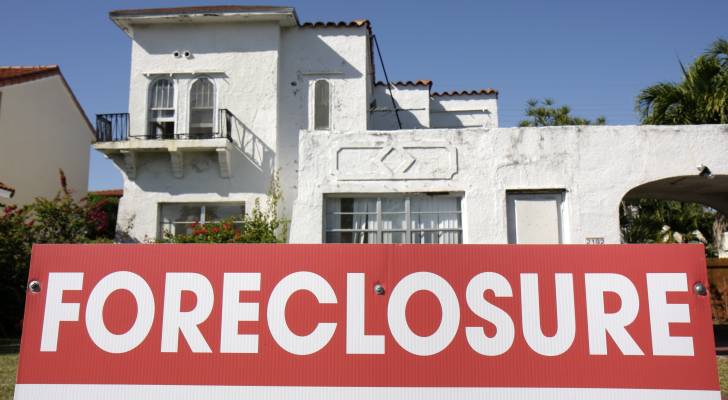
Mortgage rates are climbing in response to a sell-off off in U.S. Treasury bonds, according to CNBC.
Throw in an accelerated mortgage sell-off in China and things could get much worse. Mortgage rates tend to track the 10-year Treasury yield, so it doesn’t bode well for mortgages if investors decide to sell U.S. Treasury bonds.
Don’t miss
- I’m 49 years old and have nothing saved for retirement — what should I do? Don’t panic. Here are 5 of the easiest ways you can catch up (and fast)
- Gain potential quarterly income through this $1B private real estate fund — even if you’re not a millionaire. Here’s how to get started with as little as $10
- Thanks to Jeff Bezos, you can now become a landlord for as little as $100 — and no, you don’t have to deal with tenants or fix freezers. Here’s how
Adding to the risk is the possibility that U.S. mortgage-backed securities (MBS), 15% of which are held by foreign countries, could also be increasingly on the selling block
“If China wanted to hit us hard, they could unload Treasuries. Is that a threat? Sure it is,” Guy Cecala, executive chair of Inside Mortgage Finance, told CNBC.
At the time of writing, President Donald Trump had imposed tariffs of 145% on Chinese goods, while China retaliated with tariffs of 125% on imported American goods.
If countries like China decide to dump U.S. Treasuries and MBS in retaliation for tariffs and trade policies, how could that impact you?
Why this matters
Treasury securities are bonds issued and backed by the U.S. federal government, while mortgage-backed securities (MBS) contain pools of mortgages.
Foreign countries own $1.32 trillion of U.S. mortgage-backed securities, according to a global markets analysis from Ginnie Mae. China is one of the largest holders of agency mortgage-backed securities, along with Japan, Taiwan and Canada.
If Chinese institutions started selling off MBS — and if other countries start following suit — it could ripple through global financial markets.
Some doubt it will happen. This would “damage China’s own financial interests by devaluing its remaining holdings and destabilizing global currency markets,” Melissa Cohn, regional vice-president of William Raveis Mortgage, told Newsweek.
It’s generally thought to be in China’s best interest that the country keep its currency, the renminbi (RMB), lower than the U.S. dollar, since — as a nation dependent on exports — it wants to keep its prices competitive. Thus, by purchasing U.S. debt, China maintains the balance according to which Americans can continue to buy more Chinese products.
Still, an escalating trade war has raised uncertainty — and a sell-off isn’t off the table if China is willing to absorb losses. China had already begun selling off some of its U.S. MBS last year and there’s speculation it’s continuing to do so.
Read more: Car insurance premiums could spike 8% by the end of 2025 — thanks to tariffs on car imports and auto parts from Canada and Mexico. But here’s how 2 minutes can save you hundreds of dollars right now
What does this mean for US homebuyers?
MBS investors influence mortgage rates, based on what they’re willing to pay for mortgage-backed securities. Accelerating a sell-off would translate into lower prices for the bonds and, thus, higher mortgage rates for Americans, especially those with variable-rate mortgages.
“Most investors are concerned that mortgage spreads would widen in response to either China, Japan or Canada coming in with a retaliatory objective,” Eric Hagen, mortgage and specialty finance analyst at BTIG, told CNBC.
For those unlucky homeowners, even refinancing could leave them with higher payments. At any rate, refinancing would be less attractive, since rising rates could negate any potential savings. The 30-year fixed mortgage rate (as of April 17) averaged 6.83%, according to Freddie Mac.
Some buyers could also be priced out of the market. Higher mortgage rates can lead to a reduction in demand and, in turn, lower housing prices, so sellers may be tempted to stay put until the market improves.
Since higher rates lead to higher monthly payments — and a higher debt-to-income ratio for borrowers — this scenario can also lead to a tightening of lending standards. To mitigate risk, lenders may increase credit score requirements or require larger down payments.
If you’re looking to buy a home, secure a mortgage pre-approval so you have a budget to work with (though a pre-approval isn’t a guarantee). If you can get a good rate now, you may want to lock it in. If you’re a first-time homebuyer, you might be able to apply for an FHA loan, which is guaranteed by the Federal Housing Administration.
If demand stalls, sellers may want to consider lowering the asking price or offering incentives (such as covering the buyer’s closing costs) to sweeten the pot.
On the other hand, amid economic turmoil and plummeting consumer confidence, buyers and sellers may simply choose to wait it out.
In the meantime, it’s a good idea to build up your emergency fund to help cover higher costs if necessary.
What to read next
- Want an extra $1,300,000 when you retire? Dave Ramsey says this 7-step plan ‘works every single time’ to kill debt, get rich in America — and that ‘anyone’ can do it
- Here are 5 ‘must have’ items that Americans (almost) always overpay for — and very quickly regret. How many are hurting you?
- There’s a 60% chance of a recession hitting the American economy this year — protect your retirement savings with these essential money moves ASAP (most of which you can complete in just minutes)
This article provides information only and should not be construed as advice. It is provided without warranty of any kind.